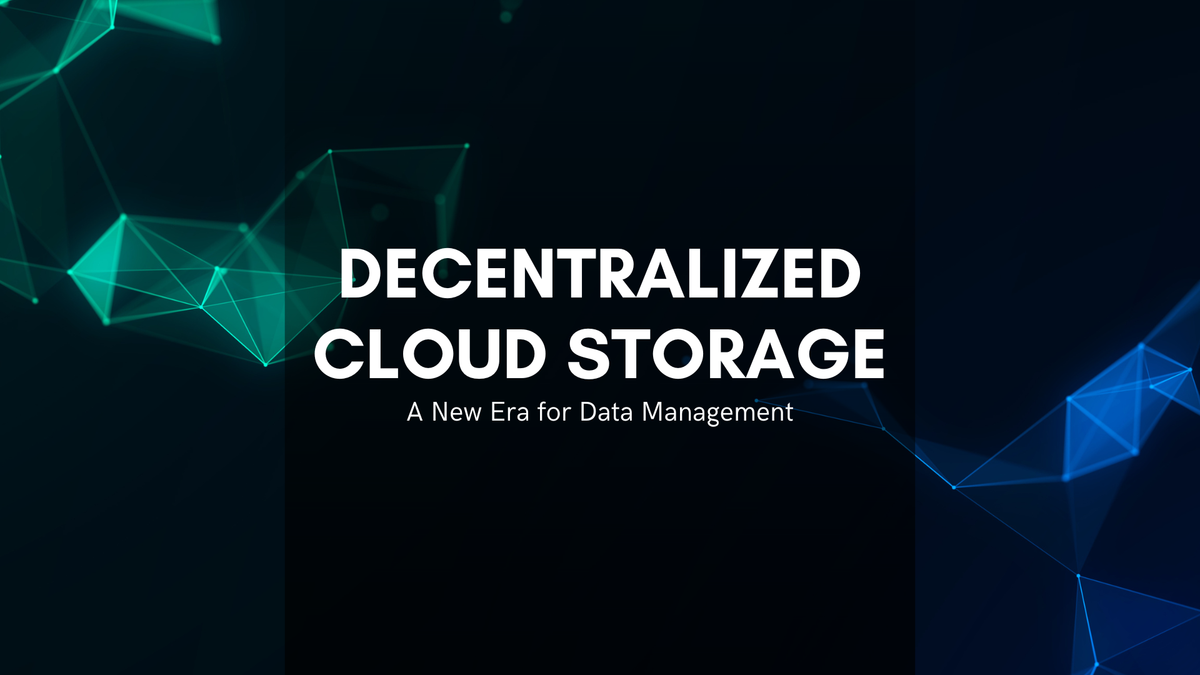Decentralized Cloud Storage: A New Era for Data Management

The digital age has brought rapid advancements in how we store, manage, and access our data. Traditionally, cloud storage services like Google Drive, Dropbox, and AWS S3 have dominated the market. They provide centralized solutions that are reliable, fast, and widely adopted. However, centralization comes with trade-offs, including concerns about privacy, data security, and the concentration of power in the hands of a few corporations. Decentralized cloud storage promises to address these issues by redistributing the workload across a network of participants, making it more secure and resistant to censorship.
What Is Decentralized Cloud Storage?
Decentralized cloud storage is a system that distributes data across a network of independent nodes, rather than storing files on centralized servers maintained by a single company. In this model, storage providers, often individuals or organizations with spare storage capacity, join a global network that allows users to rent out space or store their data securely.
In many decentralized systems, data is broken up into discrete pieces using erasure coding or sharding techniques, encrypted, and then dispersed to multiple nodes. This means even if a particular node malfunctions or is compromised, the data can be reconstructed from the remaining pieces found elsewhere on the network. This approach increases resilience and provides a robust defense against data breaches, unauthorized access, and single points of failure.
How Decentralized Cloud Storage Works
Data Fragmentation and Encryption
A key component of decentralized cloud storage is the process of fragmenting data. Instead of storing an entire file on one server, the file is segmented into multiple smaller blocks, each of which is then encrypted. These encrypted segments are distributed across many nodes in the network. When a user wants to retrieve the file, a protocol comes into play that gathers enough fragments from the various nodes to reassemble the complete file. This method ensures that even if some nodes are unavailable or compromised, the data remains recoverable and secure.
Redundancy and Network Resilience
Network resilience is achieved through redundancy. By storing multiple copies of fragments across different nodes, decentralized cloud storage networks mitigate the risk of data loss due to node failure. This storage redundancy is carefully managed through consensus protocols that decide on the number and location of copies required to maintain both security and efficiency. With this distributed approach, there is no single point of failure, unlike centralized systems where an outage at a single data center can adversely impact millions of users.
Smart Contracts and Incentives
Blockchain technology often underpins decentralized storage systems. Smart contracts, self-executing and tamper-proof pieces of code, govern the interactions between users and storage providers. These contracts define the terms of service, such as storage duration, data retrieval, and payment terms, without needing a trusted intermediary. For example, Filecoin and Storj are prominent ecosystems that leverage blockchain and token-based incentives to encourage network participation and ensure fair remuneration for storage providers.
Benefits of Decentralized Cloud Storage
Enhanced Data Security
One of the main advantages of decentralized storage is a heightened level of security. By distributing data across multiple nodes and using robust encryption, it becomes exponentially harder for hackers to compromise the system. Even if one node is breached, attackers are unlikely to access enough fragments to reconstruct the entire dataset. Moreover, the use of encryption ensures that data remains confidential, protecting sensitive information from prying eyes.
Increased Privacy
Privacy is a significant concern with centralized cloud storage systems, where your data can be accessed by the storage provider or subjected to governmental subpoenas. In contrast, decentralized systems lack a central authority capable of surveilling user activity. Data privacy is enhanced because access control is built on cryptographic keys, meaning only users with the proper authorization can decrypt and view the data.
Resilience Against Censorship
Centralized platforms are often targets for governmental control or corporate censorship, and they are sometimes compelled to remove or limit content. Decentralized cloud storage, by design, is resistant to censorship because there is no central gatekeeper who can decide what content is acceptable. Users benefit from a level of freedom and resilience that is especially appealing in regions with restrictive digital policies.
Cost Efficiency and Scalability
Decentralized systems can also be more cost-effective. Instead of relying on expensive, dedicated data centers, these networks leverage undervalued storage capacity from individual participants. With fewer overhead costs and increased competition among storage providers, users often find more competitive pricing for data storage. Additionally, scalability is substantially improved since new nodes can be added to the network at will, mirroring the growth in available resources as demand increases.
Notable Decentralized Cloud Storage Projects
Sia
Sia is one of the pioneering projects in decentralized storage. It offers a marketplace that allows users to rent and share data storage securely. Utilizing blockchain technology, Sia ensures that both hosts and renters follow the agreed-upon terms via smart contracts, which protect users financially and ensure high service standards. With its user-friendly interface and robust security measures, Sia is often cited as a transformative force in the storage market.
Filecoin
Filecoin is another groundbreaking platform that uses blockchain technology to create a decentralized storage market. It incentivizes network participants with its native cryptocurrency, Filecoin, for providing storage services. Data on Filecoin is split, encrypted, and distributed over numerous nodes, making it robust against breaches and centralized control. Filecoin has attracted significant attention and investment, positioning itself as a direct competitor to centralized cloud storage giants.
Arweave
Arweave introduces a unique concept known as “permaweb,” aimed at permanent data storage. Unlike traditional cloud storage services that require recurring payments, Arweave offers a one-time payment model for lifetime data storage. This innovation not only democratizes access to archival data but also ensures irreversibility and immutability in storage.
Challenges and Considerations
Data Availability and Reliability
While decentralized storage offers remarkable benefits, it comes with its own set of challenges. One such challenge is ensuring data availability. Since data is spread across various nodes maintained by different participants, the system must have robust protocols to handle node failures or lapses in connectivity. Redundancy and replication strategies are crucial to mitigate these issues, but finding the right balance between replication (which can increase reliability) and efficiency (to control costs) remains a key design consideration.
Speed and Performance Trade-offs
Decentralized storage systems might sometimes face latency issues compared to centrally managed cloud infrastructures. Retrieving data from dispersed nodes requires coordination and communication across a geographically scattered network. While advanced protocols and caching mechanisms are continuously improving access speeds, performance trade-offs can exist, especially in large-scale or real-time data applications. Researchers and developers are actively refining these systems to close the performance gap with centralized solutions.
Security Concerns and Attack Vectors
While decentralization inherently decreases risks associated with central points of failure, it is not entirely immune to attacks. Malicious nodes, collusion among storage providers, and cyberattacks targeting the network’s protocols can pose serious threats. To mitigate these risks, projects continually invest in advanced encryption techniques, robust consensus mechanisms, and real-time monitoring systems. Best practices in network security, as seen in projects like Filecoin and Storj, serve as critical references for maintaining the trust and reliability of decentralized infrastructures.
Conclusion
Decentralized cloud storage represents a transformative shift in data management by distributing and encrypting data across multiple network nodes. This approach significantly improves security, privacy, and resilience against censorship, while lowering costs by leveraging unused storage capacity worldwide. Although challenges remain, particularly with ensuring data availability and optimal speed, the potential for integrating decentralized storage with blockchain technology and emerging economic models is immense.
As the technology matures, decentralized storage is expected to play a key role in enhancing digital sovereignty for both individuals and businesses. With numerous successful projects likeSia,Filecoin,Storj, andArweave, the future of cloud storage is moving toward a more secure and democratized model that empowers users to control their data.
References
- https://sia.tech/
- https://filecoin.io/
- https://www.storj.io/
- https://www.arweave.org/
- https://3commas.io/blog/best-decentralized-cloud-storage-projects
- https://ambcrypto.com/
- https://www.kaspersky.com/blog/
MITOSIS official links:
GLOSSARY
Mitosis University
WEBSITE
X (Formerly Twitter)
DISCORD
DOCS



Comments ()